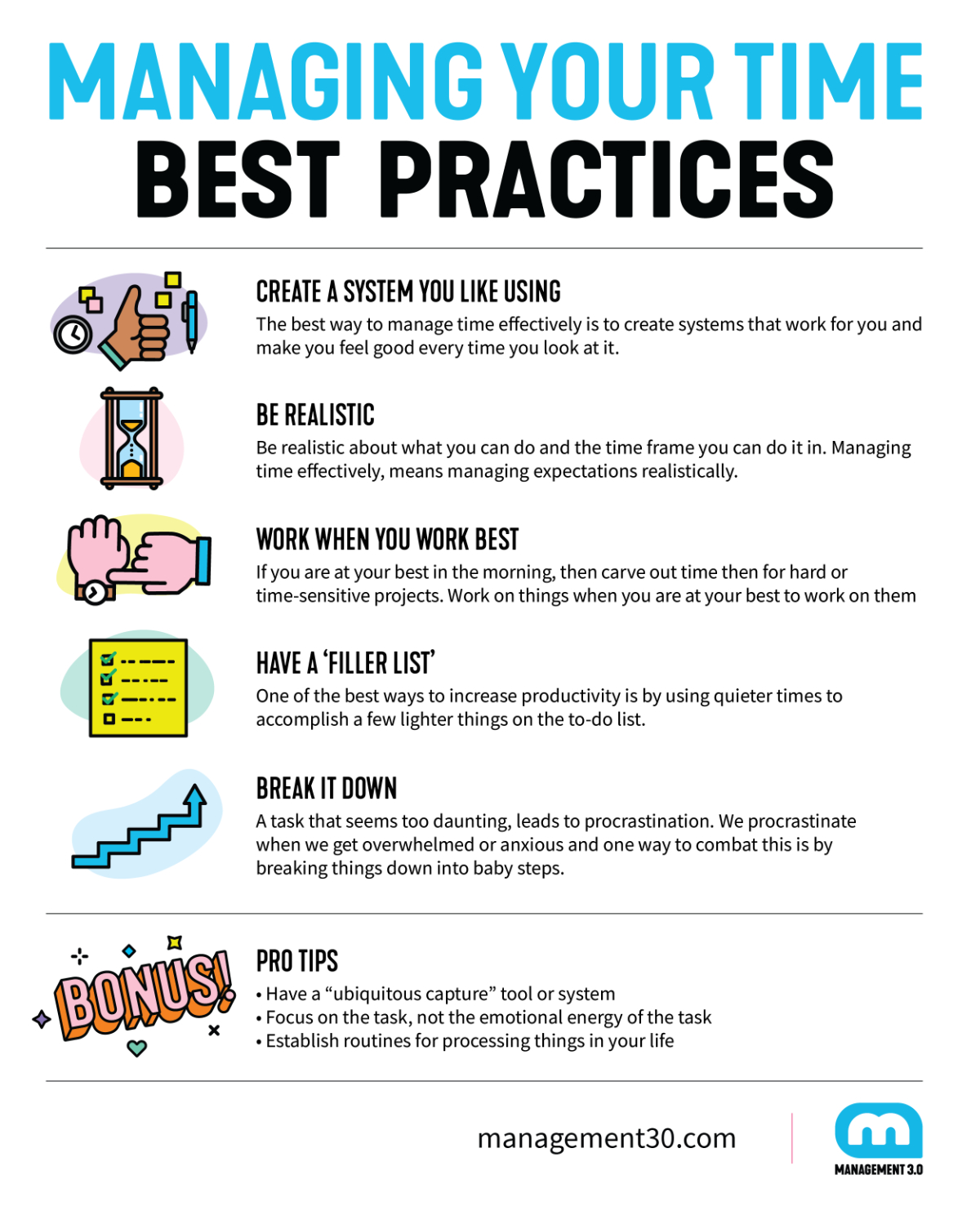How to manage time effectively and by this increase your productivity:
Quick Links:
Time management to reduces stress
Time management when working from home
Best practices on how to manage time
Tips from the expert
No matter how much work we put into productivity, somehow it always feels like there is so much to do and never enough time in the day to do it. But why? Is it because there is really so much to do? Or are we not managing time effectively enough?
In this article, we delve into how to manage our time, because time management is life management. The more we take control of our time, the more we are taking control of our lives. But before we get to the practicalities of it, let’s discuss why time management is important.
Time management to reduces stress
When we take control of our time, we are sending a signal to ourselves and those around us, that we respect our time and we respect ourselves and by doing this we reduce anxiety. We feel like we’re in the driver’s seat, rather than reacting to what’s thrown at us. The more we manage our lives, the less chaotic we feel, which puts us on top rather than grasping at straws, which can make us feel helpless. The less stressed we are, the more productive we are.
Time Management when working from home
When working from home or remotely, it’s even more important to manage time effectively, otherwise it can lead to burnout as well as being ineffective. The lines between work and personal are extremely blurred when working from home. Gone are the days where you left the office at 5pm and work was finished until 9am the following day. If we don’t take control of our time, then we can end up always working, which is unhealthy and ultimately doesn’t produce the best work.

There are various ways to manage time at home, for example:
- Create a distinction between the office space and personal space and don’t work in the personal space. This can be in the form of a curtain, or a barrier or even a line down the room
- Close the laptop and the phone for an hour during the day and go for a walk
- Have strict rules about working during meals (don’t do it)
- Have a firm cut off time at night and start time in the morning, where unless it’s an emergency you will not cross that line
- Most important: Communicate all of this to everyone in the house, so each of you can hold the other accountable
Best Practices on How to Manage Time
Let’s look into some best practices now on how to manage your time more effectively.
#1 Effective Time Management:
Create a System That you Enjoy Using and Looking at
The best way to manage time effectively is to create systems that work for you and make you feel good every time you look at it. If you like ‘old fashioned’ pen and paper, then put your to-do list on that. If you enjoy apps, or want everything in your calendar, that’s fine. The important thing is that you need to like your system so that you engage with it and don’t run from it. If you don’t like the system you’re using you’ll resist opening it and using it, which will work against you being productive.

#2 Time Management Best Practice: Be Realistic
It’s one thing to want to get everything done, it’s another to be realistic about what you can do and the time frame you can do it in. Managing time effectively, means managing expectations realistically. ⏰ One way to do this is by taking the task at hand and figuring out how many hours it’ll take to get done. Then break down the hours per day, doing a bit of work each day until the task is complete.
For example, if you have a large project that you think will take about ten hours to make a dent in, look at your calendar and figure out when you can realistically dedicate those hours. Can you do two hours each morning for the next five days? Can you do one hour for ten days, or three hours over the course of three weeks? Be realistic and then commit to what you decide to do.
Tip: How to boost productivity with nine daily rituals or How to stay productive when you’re tired
#3 How to Manage Time: Work When You Work Best
It’s not enough to have a to-do list, but you have to carve out time in your day to focus on that list, at times that make sense for the task at hand.
For example, if you have a project that requires a lot of concentration and you are at your best in the morning, then carve out time in the morning to do that project. Even if it’s just three hours, work on things when you are at your best to work on them.
Don’t just put it on the to do list and assume you’ll get to it at some point.
#4 Managing Time Effectively: Have a ‘Filler List’
There are always breaks in the day from the more intense work and when these breaks occur, one of the best ways to increase productivity is by filling that time with a few lighter things on the to-do list. Some people call this the ‘filler list’. These are things that need to get done, but perhaps don’t need hours or a quiet space. Maybe it’s sending a few text messages or answering emails or making calls you’ve been putting off.
Think about all of the 15-20 minute chunks of time you have in the day. If you add it up, there’s at least 1-2 hours where you could be ploughing through a ton of things.

#5 How to Manage Time Effectively: Break It Down
Part of the reason we do not have effective time management, is because we often don’t want to do a task that seems too daunting, so we hope it goes away, or we put it off, or we put it on the list as a whole project, but then never get to it. This leads to procrastination and experts tell us that procrastination, is more emotional than it is logistical.
Procrastination is not a time-management problem, it’s an emotion-management problem.
Tim Pychyl, an associate professor of psychology at Carleton University and blogger at Psychology Today
We procrastinate when we get overwhelmed or anxious and one way to combat this is by breaking things down into baby steps and asking ourselves: What’s the next step? When we do things one step at a time, it helps move us forward and take actions that eventually build momentum and ease that feeling of fear and anxiety.
Tip: Have you tried out a personal Kanban board for increased productivity already?

Tips from the Experts on How to Manage Time more Effectively
Experts in time management, like Robby Slaughter, workflow and productivity expert, speaker on topics related to personal productivity and corporate efficiency, say the problem most of us face when trying to increase productivity is that we focus too much on time and tasks and not enough on relationships and impact. Time management isn’t just about logistics, it’s making sure we’re emotionally OK, which is why Robby says we should schedule something positive into our weekly schedule so that we have something to look forward to.
Read on: 4 Ways You Can Add Value to Your Life by Valuing Your Time
Other tips that Time Management Expert Robby Slaughter says are crucial if you want to manage your time include:
- Have a “ubiquitous capture”
This means having one place where you put everything! When you don’t write something down, it weighs on your mind and mental weight creates burden, which reduces productivity. - Focus on the task, not the emotional energy of the task to manage your time better
We work ourselves up so often about doing something we don’t want to do, that by the time we get to it, it’s never as bad as it seems. Don’t worry about the energy it’ll take to do the task, but focus on the actual task and on getting it done. - Establish routines for processing things in your life
How often do you forget to brush your teeth? Probably not that often. Get into the pattern of doing things that process information, make it routine so that you don’t have to remind yourself of what to do when you have something that needs remembering. If you know that each time you have a task, you write it in your app or on a piece of paper, then it creates one less thing for you to remember. Make your system become routine.
Your Takeaway for better Time Management
Time management is both practical and emotional, which means that we have to keep our mental and emotional health in check. The more conscious we are about what works for us and how and when we work best, coupled with taking stock of how a task or a job is impacting us emotionally, will help us take more control of our time.
The more we take control, rather than letting our time control us, we’ll be more productive and feel more fulfilled.

Header photo: Photo by Jeffrey Paa Kwesi Opare via Pexels


Indeed it was worth investing my time to read your blog. There were many insights that would be helpful. But the best one is having a ubiquitous capture. I was not familiar with it, but after reading it now I think I need to have it to enhance my productivity. Thank you for sharing such informational blog. Hoping to read more blogs from your end!
Yours Thankfully,
A Happy Reader.
Great article. Busy people have schedules to manage their time. As a result, people should make the best use of time. In corporate life, time management can be useful to the employee.
The most enlightening part for me was : Time management isn’t just about logistics, it’s making sure we’re emotionally OK, which is why Robby says we should schedule something positive into our weekly schedule so that we have something to look forward to.